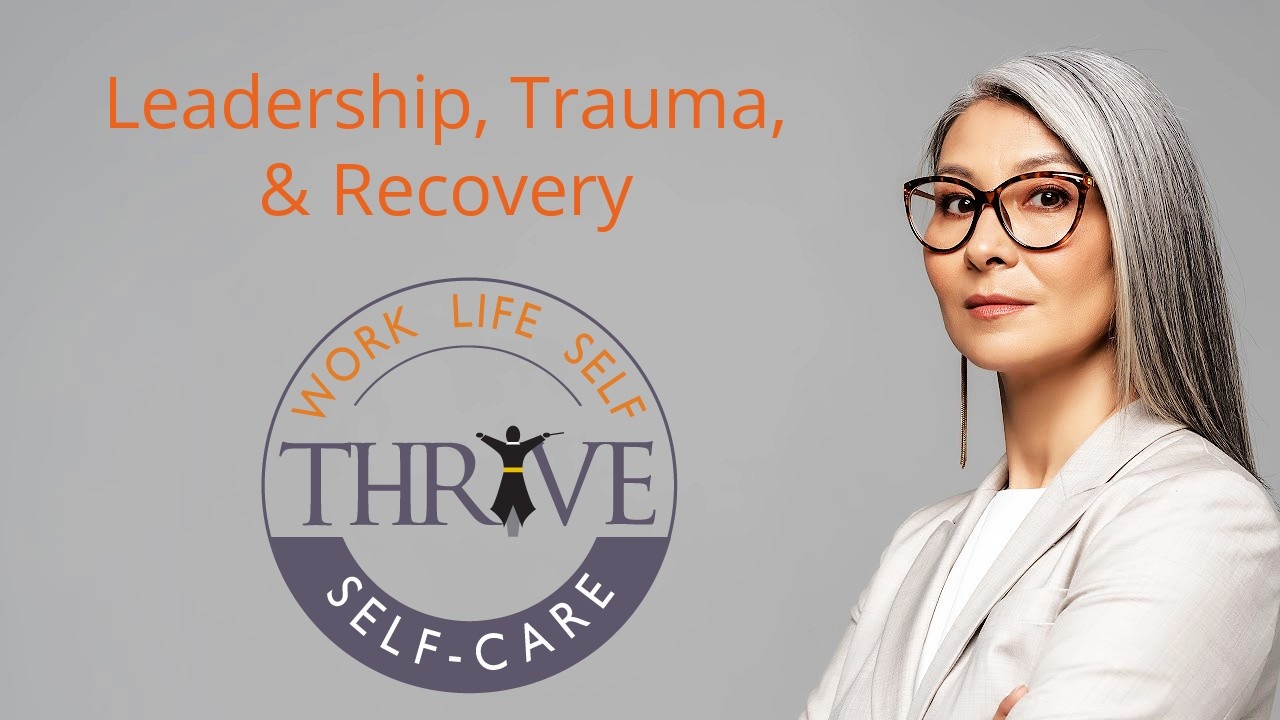
Leadership, Trauma, and Recovery: Work, Life, and Self
Jul 21, 2021The way we live and work has changed dramatically the past year, upending our routines, our identities, and for many, our sense of security. The trauma of job insecurity, health insecurity, major intergenerational loss, and culture assaults leave us reeling. We continue to feel the impact on our productivity, efficiency, effectiveness, and our self-actualization. While leaders are charged with the responsibility for their employees' well-being and safety, they are concerned about their own.
Traditionally, when employees share or demonstrate a need for assistance, we rely on our human resources department (or representative) to step in.
However, leaders need help for themselves like never before. Those who are able to work with HR and their employees through trauma recovery are better able to help those they lead and their organization.
Those who engage in coaching specific to self-leadership recognize the value and realize the benefits of utilizing resources and support to increase their awareness and effectiveness as a leader in this difficult time.
Those who do not have HR resources or do not engage in coaching at this time are at risk. The risk extends beyond themselves to their employees, their organizations, and even their families.
Trauma and the Catalyst for Change
Reports of anxiety, depression, and post-traumatic stress disorder (PTSD) are on the rise. Experiencing violence (as a victim or witness), a serious illness, or the death of a loved one can trigger post-traumatic stress. Unfortunately, fear, misunderstanding, and lack of trust prevent many leaders and employees from seeking assistance or even reporting events.
Trauma can impact anyone and everyone. Great leaders recognize this. They understand that how we manage trauma can define our life – our self-regard through to self-actualization and all the bits of work, life, and self in between.
The best leaders I know share openly about their own struggles, how they manage uncertainty, and are able to engage others to share their story. How is this leadership vulnerability contributing to recovery?
We know that negative experiences can be a catalyst for positive change. Experiences, both positive and negative, offer a new understanding about a personal strength, an impetus to explore new possibilities, a desire to improve relationships, a sense of awe for life, a spiritual renewal.
I recently had a coaching experience in which my client and I both paused in overwhelming awe - to acknowledge and be grateful for how “miraculous” our bodies are at this time.
Self-Care and Self-Compassion
I was first struck by this insight while recovering from cancer treatment. The trauma of a cancer diagnosis and the treatment that follows can and often does trigger disappointment toward our bodies. We feel like our bodies have let us down. However, we really do need have a little more respect for the daily battle that our bodies take on to keep us well. Afterall, we haven’t always done our part to help our bodies stay well. Our bodies are actually fighting for our lives. That is why self-care and self-compassion are critical to our well-being and recovery.
Care and Compassion Within Organizations
Individual well-being matters in every organization, small or large. Individual well-being coincides with organizational well-being. When leaders are equipped to treat everyone with care and compassion, employees experience lower stress and anxiety, lower absenteeism, and lower incidence of burnout. The positive effects include increased energy, engagement, and productivity, increased job satisfaction, healthy retention and attrition, and the BONUS: Employees who are able to take full advantage of their talents while being mindful of their capacity and capability. They become self-actualized and an asset that appreciates within the organization.
Posttraumatic Growth and Recovery – Work, Life, and Self
In Posttraumatic Growth: Theory, Research, and Applications, (Routledge, 2018), authors Richard G. Tedeschi, Jane Shakespeare-Finch, Kanako Taku, and Lawrence G. Calhoun share their research on trauma and how leaders can help traumatized people recover. According to Tedeschi, “…despite the misery resulting from the coronavirus outbreak, many of us can expect to develop in beneficial ways in its aftermath.”
I’ll dive in to this in my next post.
What do you think? Would a focus on self-leadership contribute to your ability to thrive at this time. I’d love to hear from you.
You can reach me on LinkedIn, and on Maestro’s Facebook. Or click to Get in Touch.
- Learn more about emotional intelligence and your journey to Self-Actualization by subscribing for updates and downloading the EQ Worksheet.
- Check out the THRIVE in Work and LifeTM programs.
- Check out the online mini-course Your Building Blocks to Emotional Well-Being and Resilience.
- Feature Video: When Cancer Collides with a Woman Entrepreneur's Life & Business, Rachel Bartholomew, Founder & CEO, Hyivy Health
Next Steps
You don’t need to navigate your Executive Encore alone. Discover a better way to take charge of your experience.
- Schedule a 30-Minute Complimentary Executive Encore Call.
Ready to elevate your encore chapter?
- Join the Executive Encore Network for Women, a membership and community of supportive women ready to inspire and uplift. Subscribe to the Sunday Encore to begin your Executive Encore Journey and register for the next Tour to learn more.


